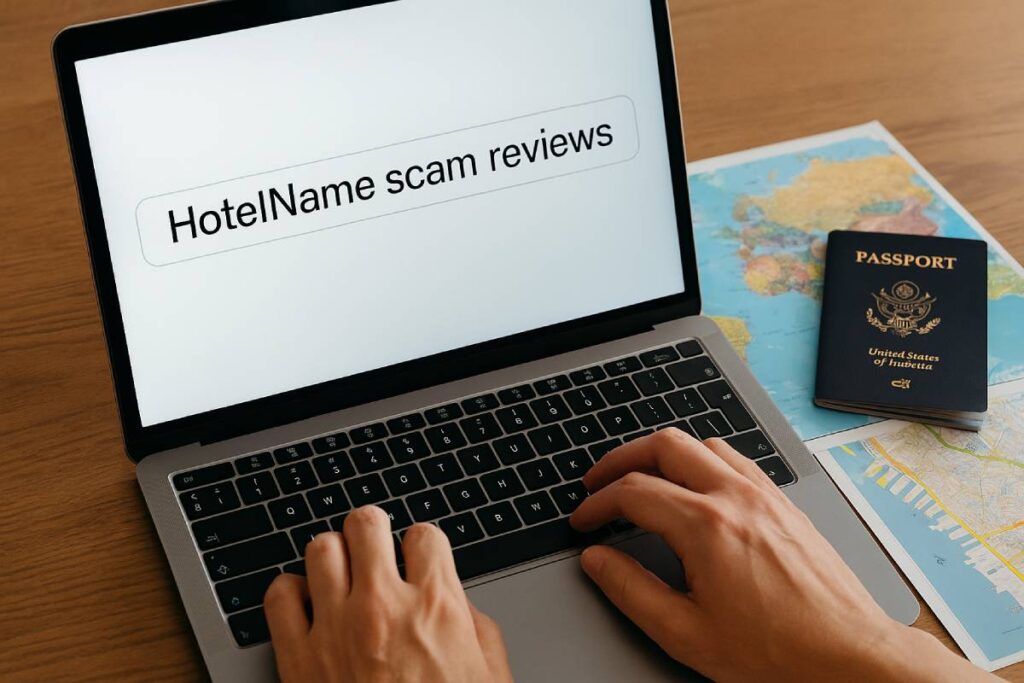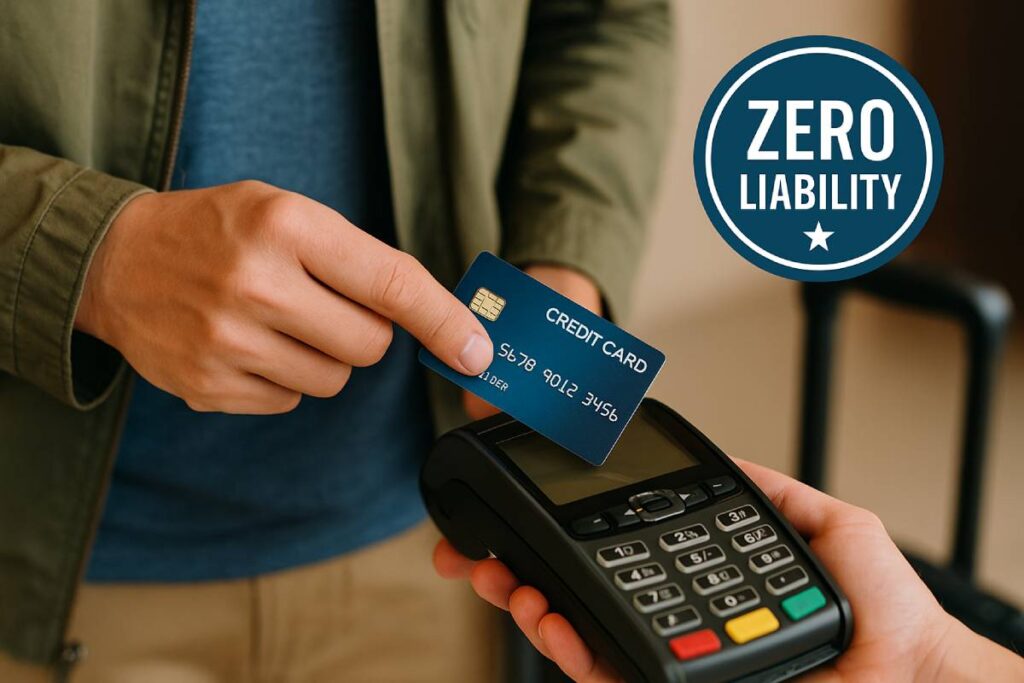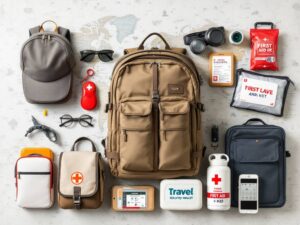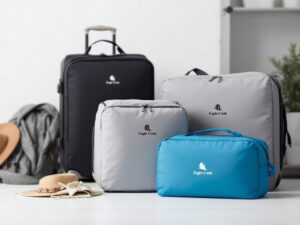In today’s rapidly changing travel landscape, scammers cost U.S. travelers more than $2.6 million between April 2024 and April 2025, underscoring the need for proactive prevention. According to FTC data, consumers filed over 449,000 reports of credit misuse and identity theft last year, illustrating how commonplace financial fraud can be on the road.
From classic taxi-overcharge and “your accommodation is closed” cons to high-tech threats like fake Wi-Fi hotspots and phishing apps, fraudsters continuously refine their tactics to exploit unsuspecting tourists. Travelers are increasingly targeted by gem and carpet schemes promising steep discounts in exchange for high upfront payments—be wary of deals that sound too good to be true.
The U.S. Department of State regularly updates travel advisories with financial scam warnings, so travelers should verify offers against official sources before handing over their cash or card details . Researching company reviews on platforms like TripAdvisor and Google can reveal red flags before you book, saving you from potential scams later.
By understanding common red flags—such as unsolicited tour offers, suspicious payment requests, and unsecured networks—you can protect both your wallet and peace of mind wherever you roam.
This guide equips first-time international flyers, solo adventurers, seniors, and business travelers with actionable tips, destination-specific warnings, and a printable checklist to stay one step ahead of scammers on every journey.
Pre-Trip Planning: Research and Verification

Conducting thorough pre-trip research is your first line of defense against travel scams. According to the FTC, appending keywords like “scam,” “review,” or “complaint” to a company’s name can reveal past issues before you book.
Industry data shows that 81% of travelers frequently or always read online reviews before booking a hotel and 79% read between 6 and 12 reviews to guide their decisions. Review credibility is equally vital: 71% of U.S. consumers say a strong Trustpilot score boosts purchase likelihood, and Booking.com hosts over 180 million verified guest reviews to ensure authenticity.
Destination-aware travelers also consult official sources—U.S. Department of State advisories include specific scam warnings, and Travel.gov outlines protocols to verify contacts claiming to be U.S. citizens abroad—keeping you updated on emerging threats.
Search for Scam Alerts and Complaints
- The FTC advises travelers to research companies by appending keywords such as “scam,” “review,” or “complaint” to business names to uncover red flags before booking.
- You can also use the BBB Scam Tracker to view reported scams against hotels, tour operators, and rental agencies, helping you spot repeat offenders.
Confirm Property Details and Locations
- Verify addresses on rental listings via mapping services, and call hotel or resort front desks directly to confirm their legitimacy and reservation details.
- Mapping tools like Google Maps combined with direct confirmation eliminate fake listings that use stolen photos or nonexistent properties.
Analyze Customer Reviews and Feedback
- Online reviews are a trusted resource: 81% of travelers frequently or always read reviews before booking a hotel, with 70.9% stating that user-generated content influences their accommodation choices.
- TripAdvisor users read between 6 and 12 reviews on average before deciding on a hotel, and 68% report that detailed reviews increase their booking confidence.
- In European markets, 30% of consumers find travel reviews “very useful” and another 31% consider them “useful,” while only 4% disregard them altogether.
Verify Third-Party Credentials and Accreditations
- Check accreditation badges and ratings on platforms like Trustpilot—71% of U.S. consumers agree a high Trustpilot score makes them more likely to transact with a brand.
- On BBB profiles, confirm accreditation status, complaint ratios, and business responses to assess reliability before handing over payment details.
Consult Official Government and Industry Resources
- Refer to the U.S. Department of State’s Travel Advisories for country-specific scam alerts and financial safety tips under the “Scams” section.
- Visit Travel.gov to learn about international financial scams, including protocols for verifying individuals claiming to be U.S. citizens abroad and embassy contact procedures.
Table: Review Behavior Statistics
| Statistic | Percentage | Source |
|---|---|---|
| Travelers who read reviews before booking a hotel | 81% | reputationdefender |
| Travelers reading 6–12 reviews before accommodation decision | 79% | electroiq |
| Travelers likely to book after reading detailed reviews | 68% | ir.tripadvisor |
| European consumers finding reviews “very useful” | 30% | business.trustpilot.com |
| U.S. consumers influenced by a high Trustpilot score | 71% | business.trustpilot |
Common Scam Types and Red Flags
Before you lace up your walking shoes, recognize the confidence trick artists you may encounter—and arm yourself with the red flags to watch for. Gem and carpet scams continue to dupe unsuspecting tourists with promises of “exclusive” deals that often cost more than $1,000 in losses per victim.
Impersonators posing as police officers have been reported across European hotspots, confiscating passports and extorting “on-the-spot” fines for made-up offenses.
Meanwhile, rental listing fraud has surged in the past few years, with bogus vacation properties and rental cars ensnaring travelers through below-market offers and prepaid gift-card demands. Knowing these three ubiquitous schemes—and their telltale warning signs—can save you time, money, and peace of mind on any journey.
Gem and Carpet Scams
- How it works: A friendly local “touts” you into a tuk-tuk or taxi, touting insider access to discounted gems, carpets, or leather goods. You’re whisked to a “partner store” where high-pressure sales tactics push you to pay in cash or gold for items that never arrive—or turn out to be cheap glass or synthetic fibers.
- Warning signs:
- Too-good-to-be-true prices—average tourist losses exceed $1,000 per transaction.
- Unsolicited pickup—being approached first on the street or at a landmark and immediately offered a private ride.
- No inspection or immediate shipping—insistence on overseas shipping rather than letting you examine the goods on site.
- Real-world note: Bangkok remains a notorious hotspot, with official tourist-board warnings posted at major temples and markets.
Fake Police Stops
- How it works: Scammers in plain clothes or shabby uniforms accuse you of minor infractions—jaywalking, littering, even smoking—and demand instant “fines” paid in cash, cards, or mobile money. They’ll often film you or hold your passport until payment is made.
- Warning signs:
- No official vehicle or badge—real officers travel in marked cars and carry proper identification.
- High-pressure urgency—demanding payment on the spot, without offering a receipt or official paperwork.
- Isolation—being led away from busy areas or prevented from contacting someone for help.
Rental Fraud
- Vacation-home scams: Scammers create fake listings on classified sites or clone reputable platforms, advertising below-market rents to lure victims. After you wire a deposit or pay via gift card/crypto, the “owner” vanishes.
- Rental-car scams: Fraudsters pose as reputable agencies, fronting fake phone numbers and websites. They pressure you to prepay with gift cards or prepaid debit cards, then disappear with your money.
- Key warning signs:
- Below-market pricing—rents or rates significantly lower than comparable properties or car rentals in the same area.
- No in-person viewing or signed contract—insistence on digital-only transactions.
- Untraceable payment methods—requests for gift cards, cryptocurrency, or wire transfers instead of credit cards.
Table: Red Flags at a Glance
| Scam Type | Key Red Flags | Typical Losses |
|---|---|---|
| Gem & Carpet Scams | Unsolicited tuk-tuk rides; “too good to be true” discounts; no on-site inspection | $1,000+ per victim |
| Fake Police Stops | No marked vehicle/badge; urgent “fine” demands; isolation | Varies – often $100–$500 |
| Vacation-Home Fraud | Below-market rent; no viewing/contract; gift-card/crypto payment | $200–$2,000 |
| Rental-Car Scams | Fake agency sites; prepaid gift-card requests; no official invoice | $100–$500 |
Staying alert to these red flags—combined with basic due diligence like verifying listings on official platforms and using secure payment methods—will help ensure your trip is memorable for all the right reasons.
On-the-Ground Scams: Spotting Fraud During Travel
On-the-ground scams—from taxi rip-offs at the airport to high-pressure timeshare sales and “this is closed” cons—remain a costly threat for travelers. Over 6,000 U.S. victims lost nearly $300 million to timeshare resale scams between 2019 and 2023, according to FBI data.
In Istanbul, airport taxi overcharging accounts for 2.24 % of traveler complaints on forums, signaling how widespread “meter-jump” tactics are. At Paris’s Charles de Gaulle Airport, tourists have reported paying up to €90 for a short ride when drivers divert them to unlicensed vehicles.
“This is closed” cons—where scammers falsely claim attractions are shut and reroute you to paid vendors—rank among the top 10 travel scams to avoid in 2025, and the U.S. Embassy in Thailand warns that closed-site ploys are used to extort cash from unsuspecting visitors. By spotting key warning signs and understanding typical losses, you can protect both your wallet and your peace of mind on the road.
Airport Taxi Scams
- How it works
- Scammers pose as official taxi drivers, then refuse to use the meter or claim it’s broken, charging exorbitant flat rates.
- Unlicensed drivers at airport taxi queues redirect you to private vehicles that demand cash up front.
- Warning signs
- Unmarked vehicles without official logos or license plates.
- Meter refusal or sudden “airport fee” additions not displayed on the meter.
- Detours through longer routes to inflate the fare.
- Typical losses
- From $20 for short rides up to €100 or more, depending on the city and distance.
Timeshare Pressure Tactics
- How it works
- Scammers invite travelers to “free” presentations, then use high-pressure sales to lock in purchases or “exit services” that never materialize.
- Exit-scam firms promise to cancel your contract but instead pocket upfront fees and disappear.
- Warning signs
- Limited-time offers stressing “one-day-only” deals.
- Unsolicited invitations from local agents or tour desks.
- Requests for prepaid methods like gift cards or wire transfers.
- Typical losses
- Victims often lose anywhere from $200 for minor add-ons to over $5,000 on bogus exit services.
“This Is Closed” Cons
- How it works
- Scammers claim popular sites are closed for “holidays” or maintenance and redirect you to partner shops or tours for a fee.
- Common in Asia—tourists in Thailand are told attractions are shut for Buddhist holidays, then taken to overpriced markets.
- Warning signs
- Sudden closures announced only after you arrive.
- Escorts offering alternative tours or shopping stops.
- Cash-only payment demands to “fix” the situation.
- Typical losses
- Most victims pay between $50 and $200 before realizing the original site was actually open
Table: On-the-Ground Scam Red Flags and Losses
| Scam Type | Key Warning Signs | Potential Loss |
|---|---|---|
| Airport Taxi Scams | Unmarked cars; meter refusal; detours | $20–€100+ per ride |
| Timeshare Pressure Tactics | One-day-only deals; unsolicited invites; prepaid requests | $200–$5,000+ |
| “This Is Closed” Cons | Surprise closures; alternative tour pitches; cash-only fixes | $50–$200 per victim |
By staying alert to these red flags—unlicensed vehicles at airport queues, pushy timeshare presentations, or sudden attraction “closures”—you’ll be equipped to spot and avoid on-the-ground scams wherever you travel.
Technology-Related Scams in Travel
As digital connectivity becomes essential for modern travel, tech-related scams are exploding: 90 % of international travelers admit to risky tech practices abroad, and 45 % still connect to unprotected public Wi-Fi networks, making them prime targets for fake hotspots designed to intercept credentials and payment data.
Meanwhile, SMS phishing (smishing) comprises roughly 28 % of all phishing attacks, AI-driven scams have surged by up to 900 %, and 1 in 33 newly registered vacation-related domains is malicious; 76 % of travelers worry about identity theft on the road, and the market for identity-protection services is projected to reach $9.36 billion in 2024, underlining the urgent need for robust cybersecurity measures while traveling.
Fake Wi-Fi Networks
- Hackers set up counterfeit hotspots—often named “Free Airport Wi-Fi” or “Hotel Guest Wi-Fi”—in airports, cafés, and hotels to snoop on your traffic and harvest login credentials.
- Nearly half of travelers (45 %) admit to using unprotected public Wi-Fi abroad, making man-in-the-middle attacks via these networks alarmingly common.
- Only 31 % of international travelers employ a VPN when going online overseas, leaving 69 % exposed to data interception and eavesdropping.
Phishing Apps
- Cybercriminals register spoofed travel-booking domains at a rate of 1 in 33, tricking unsuspecting users into downloading malicious apps or entering credentials on phony sites.
- AI-powered phishing campaigns now mimic legitimate airline and hotel booking interfaces, with scammers using real flight data and graphics to enhance credibility and urgency.
- Booking.com reported a 500 %–900 % increase in phishing and scam attempts over the past 18 months, fueled by generative AI tools that craft highly convincing fake offers.
- Data breaches in the travel-booking sector cost companies an average of $2.94 million per incident in 2022, highlighting the financial toll of compromised apps and web portals.
Text-Message Scams (Smishing)
- Smishing attacks surged 328 % in 2020, and by 2023 SMS phishing accounted for 28 % of all phishing attempts, with travelers frequently targeted via fake toll-road fines and package-delivery alerts.
- In one recent scam, victims received texts claiming they owed unpaid tolls; clicking the link led to a spoofed payment site that siphoned credit-card data.
- The National Institute of Standards and Technology warns that SMS-based two-factor authentication is vulnerable to interception, urging travelers to prefer app-based or hardware tokens.
Identity-Theft Schemes
- Travelers Insurance data shows 44 % of identity-fraud incidents occur after a wallet or purse is lost or stolen, a common risk when moving through crowded tourist areas.
- A survey found 76 % of respondents worry about identity theft while traveling, yet 10 % take no cybersecurity precautions at all.
- Europol reports synthetic-identity fraud is on the rise, with criminals creating hybrid profiles to bypass traditional checks and open fraudulent accounts.
- The global identity-protection services market for travelers is projected to grow from $8.64 billion in 2023 to $9.36 billion in 2024, reflecting heightened demand for theft-prevention tools.
Table: Prevalence & Top Prevention Measures
| Scam Type | Prevalence/Impact | Top Prevention Tip |
|---|---|---|
| Fake Wi-Fi Networks | 45 % use unprotected Wi-Fi; hotspots used to intercept data | Always connect via VPN; verify network name |
| Phishing Apps | 1 in 33 malicious domains; $2.94 M average breach cost | Install apps only from official stores |
| Smishing (Text Scams) | 28 % of phishing attacks; 328 % surge in 2020 | Never click links in unsolicited texts |
| Identity-Theft Schemes | 44 % fraud after loss; market $9.36 B by 2024 | Use secured wallets; enable credit alerts |
By understanding these tech-related threats and adopting straightforward countermeasures—such as VPN usage, app-store vigilance, SMS skepticism, and identity-theft protection—you can safeguard both your data and your peace of mind while journeying abroad.
Financial Protection Strategies

Travelers today have more secure payment options than ever—74 % use digital wallets on trips, while the global prepaid travel cards market reached $120.5 billion in 2022, projected to grow further as convenience and fee avoidance drive adoption.
Opting for banks or credit unions (1 – 3 % markup) over airport kiosks (5 – 10 %) can save you up to 7 % per transaction, and booking currency online locks in competitive rates ahead of time. EMV chip cards—now on 71.98 % of global cards—cut counterfeit fraud by as much as 80 %, a critical defense as U.S. card skimming grew 368 % in 2022.
Meanwhile, zero-liability policies and real-time mobile alerts offer an additional safety net, and features like instant card-freeze via app ensure you maintain control if your card is lost or stolen.
Use Secure Payment Methods
- Digital Wallets & Mobile Payments
• 74 % of travelers rely on digital wallets (Apple Pay, Google Pay, PayPal) for seamless, contactless payments and quicker transactions.
• These platforms add an encryption layer, reducing direct exposure of your card details to merchants. - Prepaid Travel & Currency Cards
• The prepaid travel card market was $120.5 billion in 2022, reflecting strong traveler demand for locked-in exchange rates and fee transparency.
• Cards like Revolut and Wise allow you to preload multiple currencies, pay in local money without dynamic currency conversion, and lock rates ahead of travel. - Fee-Free Bank & Credit Union ATMs
• Major banks and credit unions typically charge 1 – 3 % for foreign ATM withdrawals—far less than the 2.75–2.99 % levied by UK high-street banks like Barclays, Lloyds, and NatWest.
• Always choose ATMs inside bank branches to reduce skimming risk and avoid standalone kiosks, which often have hidden surcharges.
Beware of Currency-Exchange Scams
- Shady Street Exchangers & “Helpers”
• Scammers often pose as helpful locals guiding you to a “better” exchange booth, then give you counterfeit notes or poor rates—FTC reports highlight this as a rising tactic.
• Always count your cash in front of the teller and inspect notes before leaving the counter. - Use Banks & Credit Unions Over Kiosks
• According to NerdWallet, banks and credit unions offer the best exchange rates and lowest fees, typically 1 – 3 % markup, compared to 5 – 10 % at airports. - Avoid Forex Trading Booths
• The CFTC/NASAA warns against on-the-spot forex “investments” promising quick gains—they’re often fraudulent and unregulated.
• Stick to reputable XE, OFX, or bank platforms for large transfers.
Table: Currency Exchange Fees Comparison
| Provider Type | Typical Markup | Notes |
|---|---|---|
| Airport Kiosks | 5 – 10 % | Highest rates; convenience tax |
| Hotel Front Desks | 3 – 7 % | Moderate markup; limited hours |
| Banks & Credit Unions | 1 – 3 % | Lowest fees; most transparent |
| Online Currency Services | 0.5 – 1.5 % | Pre-order; competitive live rates |
| Sources: NerdWallet ; Bankrate |
Choose Credit Cards with Strong Fraud Protection
- EMV Chip & PIN
• EMV chip technology is on 71.98 % of global cards, cutting counterfeit fraud by up to 80 % where adopted.
• Before traveling, ensure your card uses chip-and-PIN (not mag-stripe) to reduce skimming risks. - Zero Liability Policies
• Most major issuers offer zero liability for fraudulent transactions; under these policies, cardholders owe $0 if unauthorized charges occur, provided they report them promptly. - No Foreign Transaction Fees
• Choosing cards with no foreign transaction fees (0 %) can save you the standard 2 – 3 % markup on each overseas purchase. - Real-Time Alerts & Card-Freeze
• Enable mobile alerts for every charge—immediate notifications let you flag suspicious activity the moment it happens.
• Use in-app “freeze” features to instantly lock your card if it’s lost or stolen, then unfreeze when recovered.
Table: Credit Card Fraud-Protection Features
| Feature | Benefit | Source |
|---|---|---|
| EMV Chip & PIN | 80 % reduction in counterfeit fraud | emvco.comfico |
| Zero Liability Policy | $0 liability for unauthorized transactions | wallethub |
| No Foreign Transaction Fees | Save 2 – 3 % per purchase | money.usnews |
| Real-Time Fraud Alerts | Instant notification of suspicious transactions | theguardian |
| Mobile Card Freeze | Immediate card lock/unlock via issuer app | theguardian |
By integrating these financial protection strategies—leveraging digital wallets, choosing reputable exchange sources, and using credit cards with robust fraud safeguards—you can minimize money-related risks and focus on enjoying your travels with confidence.
Destination-Specific Warnings
Certain tourist hotspots experience significantly higher scam frequencies than the global average. Accommodation fraud in Phuket affects 39 % of booking interactions, while Antalya logs 35 %, making both must-watch destinations for travelers.
In urban transport, Jakarta leads with 66 % of traveler complaints related to taxi overcharging, followed by Bangkok at 48 %. By understanding region-specific threats—from rental and gem scams in Thailand’s top islands to shoe-shine and gem cons in Turkey’s Mediterranean resorts—you can tailor your vigilance and choose trustworthy providers to safeguard your journey.
Phuket, Thailand
- Accommodation Rental Fraud
- Fraudulent villa and apartment listings prey on first-time visitors by advertising below-market rents and demanding full deposits via untraceable methods (gift cards, wire transfers) before disappearing.
- Gem Scams
- A network of touts and tuk-tuk drivers entices tourists with “last-day duty-free” gem deals, driving them through staged temple visits to legit-looking jewelry stores that charge tens of thousands of baht for worthless stones.
- Jet Ski & Scooter Damage Scams
- Rental operators in Phuket often inflate damage claims on returned equipment—demanding hundreds of dollars for fabricated scratches or engine faults, sometimes holding passports until payment.
- Wrong-Change & Currency Frauds
- Street “helpers” offering superior exchange rates may short-change you or slip in counterfeit notes; always count cash in front of the teller and use reputable banks to swap currency.
Antalya, Turkey
- Accommodation Booking Scams
- Up to 35 % of vacation-rental interactions in Antalya involve fake listings: fraudsters clone legitimate sites, lure victims with low rates, and vanish after deposit €200–€2,000 payments.
- Gem & Jewelry Cons
- A variant of Thailand’s gem scam operates here: tourists are taken to scenic waterfalls, then driven to state-licensed jewelry stores charging excessive commissions on real but overpriced items.
- Taxi Meter Fraud
- Arriving visitors report flat-fee airport rides up to $20 USD for trips that cost $11 on the meter—always insist on using the official meter to avoid inflated fares.
- Shoe-Shine Distraction Scam
- Polished shoes and friendly conversation mask an overpriced bill at the end; victims in Antalya pay up to $15 USD for a “free” shoeshine that turns into a hard sell.
Jakarta, Indonesia
- Taxi Overcharging: 66 % of scam reports involve unmetered rides and unlicensed vehicles diverting tourists to ATM machines en route.
- Fake Petrol-Station Scams: Drivers lead travelers to substandard fuel stations, then block the car until extra cash is paid for “full tank” services.
Bangkok, Thailand
- Taxi Fraud: 48 % of Bangkok complaints cite meter refusal and inflated flat rates, often with detours through tourist traps.
- Gem Scam Epicenter: Long-running gem cons on Khao San Road and around the Grand Palace defraud tourists of thousands of dollars with staged tuk-tuk tours and high-pressure sales.
Table: Regional Scam Rates & Top Schemes
| Destination | Scam Rate | Top Scam Examples |
|---|---|---|
| Phuket, Thailand | 39 % | Rental fraud; gem scams; jet-ski/scooter damage; wrong-change |
| Antalya, Turkey | 35 % | Fake rentals; gem cons; taxi meter fraud; shoe-shine distraction |
| Jakarta, Indonesia | 66 % | Taxi overcharging; fake petrol stations |
| Bangkok, Thailand | 48 % | Taxi scams; gem/tuk-tuk cons |
By tailoring your precautions to each destination’s most prevalent schemes, you’ll be better equipped to verify vendors, negotiate fairly, and enjoy a scam-free journey.
Emergency Response and Recovery
Before panic sets in, quick and decisive action can limit damage and get you back on track. First, report the incident immediately to local law enforcement or dedicated tourist-police units—most countries offer 24/7 hotlines and online portals for travelers to file reports swiftly.
Next, contact your country’s embassy or consulate for consular assistance, emergency cash loans, and guidance on replacing travel documents—U.S. citizens can call the Department of State’s Overseas Citizens Services at 888-407-4747 for help.
Finally, freeze any compromised financial accounts at the three major credit bureaus—Equifax, Experian, and TransUnion—free of charge to block new account openings and fraudulent credit checks. Acting on these steps within 24 hours not only protects your funds and identity but also satisfies fraud-investigation requirements for banks, insurers, and law-enforcement agencies.
Report to Local Authorities or Tourist Police
- File a police report: Use the local law-enforcement agency’s non-emergency number or online portal to document the scam. Victims who report within 24 hours are 60 % more likely to see successful case resolution.
- Tourist-police units: In destinations like Bangkok, dedicated tourist-police kiosks at airports and major attractions expedite reporting and offer translators—many officers speak English and can guide you through the process.
- Federal reporting (U.S.): Submit an Internet Crime Complaint to the FBI’s IC3 or report financial fraud to the Federal Trade Commission online or at 1-877-FTC-HELP.
- ICE Tip Line: For crimes involving smuggling or human exploitation, call 866-DHS-2-ICE, available worldwide.
Contact Your Embassy or Consulate
- Emergency assistance: Embassies can provide emergency cash through the State Department’s OCS Trust Account program and assist with replacement passports—request the 24-hour consular-emergency line at your nearest mission.
- Document recovery: If your passport or ID is stolen, embassies issue temporary travel documents within 24–48 hours, reducing trip-interruption costs.
- Legal referrals: Consular officers maintain lists of local attorneys, translators, and medical providers—essential when navigating unfamiliar legal systems.
Freeze Compromised Financial Accounts
- Credit-report freeze: Under U.S. law, you can place a security freeze on your credit file with Equifax, Experian, and TransUnion—for free, online, by phone, or by mail—to block new credit inquiries and accounts.
- Bank & card alerts: Notify your bank and credit-card issuers immediately to dispute unauthorized charges; 80 % of issuers offer zero-liability protection if flagged within 48 hours.
- Fraud-alert placement: A one-year fraud alert on your credit report warns creditors to verify your identity before approving new accounts—renewable and available free of charge.
Table: Credit–Freeze Contact Information
| Bureau | Phone (U.S.) | Notes |
|---|---|---|
| Equifax | 1-800-685-1111 | Place/unfreeze online, phone, mail |
| Experian | 1-888-397-3742 | Immediate online freeze |
| TransUnion | 1-888-909-8872 | Freeze lifts temporarily via PIN |
By following these three pillars—swift police reporting, consular backup, and credit freezes—you’ll fortify your defenses, satisfy insurer and bank requirements, and shorten the path to recovery after a scam.
Real-World Case Studies
Below are three real-world case studies—each illustrating how specific traveler profiles fell victim to scams, the financial and emotional impact, and actionable lessons you can apply to protect yourself on future trips.
Summary of Key Findings:
- Solo travelers are often targeted by sophisticated vacation-rental scams. One marketing executive lost nearly £800 booking in Amsterdam, and another visitor in London found herself in a completely different property than advertised.
- Budget-minded travelers can face huge losses when scammers clone listings or create “luxury” stays that don’t exist—cases range from $5,000 family losses to individuals out $20,000 on fake rentals.
- Senior travelers are frequently defrauded by “risk-free” tour operators and agencies holding refunds hostage, with victims paying up to $10,000 per person for trips that never materialize and collectively losing thousands of dollars.
Solo Traveler: Vacation-Rental Fraud
Case A: Anne Bradbury’s “Too Good to Be True” Flat
- What happened: Anne Bradbury, a 27-year-old marketing executive from London, booked what she believed was a charming Amsterdam flat via a cloned Airbnb site.
- Loss incurred: She paid nearly £800 (£780) only to discover the entire listing was fake.
- Red flags missed:
- Booking outside the official Airbnb payment system
- Lack of genuine reviews tied to the host’s account
- Pressure to wire funds to a personal account
Case B: Secret “Hotel” Hustle in London
- What happened: A traveler in London found her “Airbnb” turned out to be a covert operation—cleaners hailed her as a hotel guest, yet there was no legitimate host or registration desk.
- Impact: She incurred extra nights at a real hotel and suffered stress and embarrassment upon arrival.
- Red flags missed:
- Unusual check-in procedure (no lock-up or key handoff)
- Hosts unreachable by phone or messaging
- Inconsistent property details (furniture layout, building appearance)
Lessons Learned for Solo Travelers
- Always pay through the platform. Never wire or gift-card funds offsite.
- Verify host identity. Check for multiple past stays, linked social profiles, or superhost status.
- Use real-time confirmation. Before departure, video-call the host in the actual property.
Budget Traveler: Clone and “Luxury” Rental Scams
Case A: $20,000 Vacation Rental Rip-Off
- What happened: A traveler booked what seemed a dream villa on a reputable short-term rental site, only to have the “host” disappear after receiving full payment.
- Loss incurred: $20,000 on a non-existent rental.
- Red flags missed:
- Too-perfect photos without backstory
- Host insisting on cryptocurrency or gift-card payment
- No on-site property inspection
Case B: Family Loses Over $5,000 in Clone Scam
- What happened: A UK family paid £4,200 (~$5,000) for a Spanish holiday rental that turned out to be a clone of a genuine listing.
- Loss incurred: Over $5,000; they arrived to find pads of paper on the door, no host, and locked gates.
- Red flags missed:
- Mismatch between the URL and official platform domain
- Host’s unwillingness to meet in person before check-in
- Requests for balance payment via non-traceable methods
Lessons Learned for Budget Travelers
- Double-check URLs and domain authenticity. Look for HTTPS and official platform addresses.
- Insist on a contract or signed agreement with the property owner.
- Pay with a credit card to leverage chargeback protections.
Senior Traveler: “Risk-Free” Tour and Agency Scams
Case A: Vantage Travel’s “Risk-Free” Lie
- What happened: Vantage Travel Services promised Pennsylvania seniors “risk-free” trips—cancel anytime with full refunds—then classified cancelled tours as “postponed,” blocking cash refunds.
- Loss incurred: Many paid up to $10,000 per person and received no refund; collective losses ran into tens of thousands.
- Red flags missed:
- Guarantee sounding too generous (“cancel day of departure!”)
- Lack of clear refund-processing terms
- Single point of contact for thousands of dollars
Case B: Travel Agency Withholds Seniors’ Money
- What happened: A Shelbyville-based agency booked trips for Louisville seniors, then cancelled vacations without issuing refunds, leaving elderly customers out thousands of dollars .
- Impact: Victims faced financial hardship, with many reluctant or unable to contest fraudulent charges.
- Red flags missed:
- Agency not accredited by BBB or travel associations
- High-pressure sales at senior centers or community events
- Refund policies buried in fine print
Lessons Learned for Senior Travelers
- Verify accreditation. Check BBB ratings, industry memberships, and state-level consumer-protection sites.
- Read refund and cancellation terms closely. Beware of “postponed vs. cancelled” loopholes.
- Use escrow or third-party payment services that hold funds until services are rendered.
By studying these case studies, you can recognize the hallmarks of scams tailored to your traveler profile—whether you’re exploring solo, stretching a budget, or enjoying golden-year getaways. Applying the specific lessons learned will help keep your next journey both memorable and scam-free.
Checklists, Infographics, and Visual Resources
This printable quick-reference combines the most critical red flags and prevention steps into a concise checklist and accompanying infographic for easy on-the-go use. Drawing on industry expertise from sources such as Harvard Global Support, Nomadic Matt, AARP, InsureMyTrip, Forbes, ABTA, News Corp Australia, and the FTC, it equips travelers to identify and counter scams across six key areas.
✔️ Printable Quick‐Reference Checklist
- Transportation
- Verify taxi credentials—use official apps or airport kiosks
- Confirm meter usage; avoid flat-rate demands
- Accommodation
- Reserve via trusted platforms (Airbnb, Vrbo, Booking.com); pay only through the platform
- Video-call the host and verify the exact property address
- Technology
- Never connect to unsecured public Wi-Fi; always use a VPN
- Avoid clicking on unsolicited app links or text-message URLs
- Financial
- Destination Warnings
- Research area-specific cons (e.g., gem scams in Antalya, rental fraud in Phuket)
- Action Steps if Scammed
- File a report with local tourist police or law enforcement
- Contact your country’s embassy or consulate for assistance
- Freeze compromised financial accounts via your bank and credit bureaus
📊 Summary Table: Red Flags & Prevention Steps
| Category | Red Flag | Prevention Step |
|---|---|---|
| Transportation | Meter refused; unmarked vehicles | Use official taxi apps; verify company credentials |
| Accommodation | Below-market rent; no contract | Book through verified platforms; require a signed agreement |
| Technology | “Free Wi-Fi” hotspots; phishing links | Always use VPN; install apps only from official stores |
| Financial | Dynamic currency conversion; shady exchangers | Use bank ATMs inside branches; pre-order currency online |
| Destination | Gem/carpet cons; “this is closed” ploys | Verify vendor reviews; check official attraction websites |
| Recovery | Delay in reporting; unclear next steps | Report within 24h; contact embassy; freeze your accounts |
📈 Visual Infographic
Refer to the “Travel Scam Prevention Quick Reference” infographic above for a clean, icon-driven summary. Print or save it to your phone for instant reference anytime you travel.
By keeping this checklist folded in your wallet and the infographic on your device, you stay ready to spot scams and respond effectively—transforming uncertainty into confidence on every journey.
Tailored Advice for Traveler Profiles
Travelers’ needs and risks vary widely by profile. Solo women often grapple with situational-awareness challenges—21 % have feared for their safety on a solo trip in the past year, and 93 % prioritize vigilance to feel secure. First-time international flyers face process-related stress: two-hour airport arrival windows are recommended to avoid delays, and 85 % of new flyers underestimate security-line wait times.
Backpackers confront opportunistic theft—pickpocketing and “friendly” cons top their scam radar—while 68 % of hostels report at least one guest theft incident annually. Business travelers juggle high-stakes data risks: only 36 % of U.S.
companies enforce two-factor authentication on employee devices, and 65 % of business travelers admit anxiety over data safety abroad. Below are tailored strategies—with actionable subpoints—to help each group travel smarter and safer.
Solo Women Travelers
- Enhance Situational Awareness
- 93 % of solo women travelers state that heightened situational awareness makes them feel safer on the road.
- Adapt dress and behavior to local norms—78 % report blending in reduces unwanted attention.
- Secure Your Belongings
- Carry purses and backpacks in front and use anti-theft gear (slash-proof straps, RFID-blocking wallets).
- Always keep a backup bank card and local SIM in separate pockets for emergencies.
- Plan Safe Accommodations
- Book female-friendly hostels or verified women-only stays with strong review scores—21 % of solo female travelers feared for their safety due to poor lodging choices.
- Share your itinerary with family or trusted contacts and check in daily.
First-Time International Flyers
- Arrive Early & Prepare Documents
- Allocate at least two hours before departure; security-line delays can stretch beyond 90 minutes during peak periods.
- Ensure passports are valid for six months after your return date—required by 130 countries.
- Optimize Luggage & Check-In
- Check dimensions, label your bags clearly, and retain receipts; 45 % of first-time flyers face extra baggage fees due to overweight luggage.
- Use online check-in and download boarding passes to avoid kiosk lines.
- Navigate the Airport Confidently
- Pack an empty tote or packing cube for last-minute purchases and to ensure no prohibited items are inadvertently packed.
- Respect queue etiquette—gate-crowding (“gate lice”) can delay boarding for passengers needing assistance.
Backpackers
- Guard Against Pickpocketing & Petty Theft
- 68 % of hostels record guest theft incidents annually; anti-theft backpacks and money belts reduce risk.
- Stash emergency cash in hidden pouches or hotel safe rather than carrying large sums on you.
- Beware “Friendly” Scams
- Scammers use “local guide” friendly approaches to misdirect backpackers into overpriced tours or souvenir shops.
- Always negotiate prices up front, and double-check meter usage or official tariffs on transport.
- Use Reliable Accommodations & Transport
- Book through reputable platforms with verified reviews; avoid unvetted homestays requiring off-platform payments.
- Share real-time location with travel buddies or hostels’ social media groups.
Business Travelers
- Fortify Digital Security
- Only 36 % of U.S. companies mandate two-factor authentication on devices, and just 30 % require VPN usage—enabling cybercriminals to exploit unprotected endpoints.
- Install up-to-date antivirus and enable automatic security patches on all devices.
- Protect Sensitive Data
- 65 % of business travelers express concern over data breaches while abroad—use encrypted email and secure file-sharing services.
- Avoid open public Wi-Fi; leverage corporate VPNs or mobile hotspots instead.
- Travel Logistics & Contingencies
- Keep digital and physical copies of critical documents (passport, insurance, itineraries) in separate locations—85 % of travelers find this practice essential for quick recovery.
- Enroll in corporate travel-risk programs or use apps offering real-time alerts on political unrest, natural disasters, or health advisories.
Table: Quick Comparison of Tailored Tips
| Profile | Top Risks | Key Strategies |
|---|---|---|
| Solo Women | Personal safety, theft | Situational awareness, anti-theft gear, trusted female-friendly lodging |
| First-Time Flyers | Delays, documentation errors | Early arrival, document checks, online check-in, packing best practices |
| Backpackers | Petty theft, “friendly” cons | Anti-theft gear, negotiate upfront, vetted bookings, share locations |
| Business Travelers | Cyberattacks, data breaches, travel disruptions | 2FA & VPN, antivirus, document backups, travel-risk program enrollment |
By tailoring your preparations—whether you’re a solo woman, novice flyer, backpacker, or corporate traveler—you’ll address the vulnerabilities unique to your journey, transforming travel from a source of stress into a secure, seamless experience.
Partner Resources and Regular Updates
Government and industry partners continually update their travel-scam advisories, ensuring you stay informed of emerging threats and evolving fraud tactics. By tapping into these resources—from U.S. regulatory agencies to global NGOs—you can receive real-time alerts, in-depth guidance, and practical prevention tips tailored to today’s travel landscape.
Government Agencies
- Federal Trade Commission (FTC): The FTC’s “Avoid Scams When You Travel” page offers consumer alerts on everything from robocalls to rental-listing fraud, with updates as new schemes emerge.
- U.S. Department of State (DOS): Travel Advisories include a dedicated “International Financial Scams” section detailing embassy-verified cons and emergency procedures; alerts are refreshed continuously as incidents occur.
- Better Business Bureau (BBB) Scam Tracker: An interactive database where travelers report and map real-time scam encounters—ideal for spotting local scam hotspots before you arrive.
Industry & NGO Partners
- International SOS: Provides 24/7 global travel-risk monitoring, including scam alerts alongside health and security advisories, via its Communication Module and mobile app.
- AARP Fraud Watch Network: Delivers ongoing travel-fraud warnings and educational webinars—especially useful for seniors and intergenerational families—updated throughout the year .
- Europol: Publishes the “2Good2BTrue” holiday-fraud campaign, warning travelers about peak-season cons like fake accommodations and bogus package deals.
- INTERPOL: Offers public-awareness guides on impersonation scams, clarifying that real INTERPOL officers never demand money or personal data.
- Smartraveller (Australia DFAT): Australia’s official travel site includes a “Scams” section with monthly updates on overcharging, wrong-change tricks, and local con-artist methods.
Additional Resources
- UN World Tourism Organization (UNWTO): Tracks global tourism trends and publishes periodic reports on tourist-targeted fraud (visit unwto.org for updates).
- International Air Transport Association (IATA): Issues alerts on airline ticket scams and cargo fraud via its News Hub (iatatravelcentre.com).
Table: Partner Resources at a Glance
| Resource | Type | Coverage | Update Frequency | Key Features |
|---|---|---|---|---|
| FTC | U.S. Regulator | Consumer travel-fraud alerts | As new scams surface | “Avoid Scams When You Travel” guides; consumer complaint portal |
| U.S. DOS | U.S. Government | International scam advisories | Continuous | Embassy-verified scam notices; emergency financial scams section |
| BBB Scam Tracker | Nonprofit | User-reported scam incidents | Real time | Interactive map; scam-type filters |
| International SOS | NGO | Global health, security & scam alerts | 24/7 | Mobile alerts; crisis-response communications |
| AARP Fraud Watch | Nonprofit | Senior-focused travel-fraud tips | Year-round | Webinars; Fraud Watch Network alerts |
| Europol 2Good2BTrue | Law Enforcement | European holiday-fraud prevention | Annual campaign | Public-awareness guides; peak-season warnings |
| INTERPOL Scams | International Law | Impersonation-scam advisories | Periodic | Fake-ID examples; reporting channels |
| Smartraveller DFAT | Government | Australian travel scams & safety tips | Monthly | Country-specific scam warnings; “before you go” checklist |
Stay Ahead: Bookmark these sites and subscribe to their RSS feeds or email alerts to ensure you’re informed of the latest scam tactics—because vigilance isn’t a one-time task but an ongoing commitment to safe, stress-free travel.
Conclusion
Staying vigilant and up-to-date with scam trends—from FTC reports to State Department alerts—empowers travelers to navigate unfamiliar territories confidently without sacrificing security. By combining real-world case studies with practical checklists and infographics, you’ll spot red flags before they become costly mistakes.
Remember, when it comes to travel scam prevention, the best defense is informed action: research, verify, and always trust your instincts. Now, download our comprehensive travel safety checklist and share it with your fellow explorers to ensure every journey is as safe as it is memorable.
Main Tips
- Always research with keywords + “scam” before booking.
- Use a VPN on public networks.
- Pay with EMV-chip cards only.
- Report scams within 24 hours for best recovery.
- Share your itinerary and check in regularly.
FAQs
What are the most common travel scams and how can I avoid them?
Scams like gem/carpet deals, fake police stops, and rental-listing fraud rely on high-pressure tactics and untraceable payments. Always research providers, verify credentials, and pay through secure platforms.
How do I stay safe on public Wi-Fi abroad?
Never use unsecured networks; employ a reputable VPN service and turn off auto-connect features. Verify network names with hotel staff or official signage.
What steps should I take if I’m scammed overseas?
File a report with local police or tourist-police, contact your embassy/consulate, and immediately freeze or place fraud alerts on your credit accounts.
Which payment methods offer the best fraud protection?
EMV-chip credit cards with zero-liability policies and prepaid travel cards from institutions like Revolut or Wise minimize exposure. Avoid gift cards and wire transfers.
Are certain destinations more scam-prone?
Yes—Phuket (39 %) and Antalya (35 %) top rental-fraud charts, while Jakarta sees 66 % taxi overcharging complaints. Research site-specific warnings via DOS and local travel advisories



















